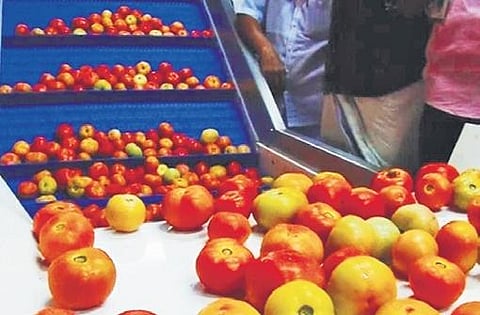

PALAKKAD: Cooperative societies in the state may be in the news for the wrong reasons, but Mannarkkad Rural Service Cooperative Bank is looking to be an exception. It has taken the initiative to set up a commercial ozone-bubble vegetable and fruit washing machine to provide pesticide-free produce.
“We have completed the trial run of the unit, which cost `60 lakh. Its working was witnessed by officials of Kerala Bank, Kerala Land Development Corporation (KLDC) and Nabard. We tested the vegetables at the lab of the Vellanikkara College of Agriculture which revealed no traces of any chemical fertiliser or pesticide. The residue had been reduced to such a level that it was virtually undetectable,” said M Purushothaman, secretary of the bank.
Explaining the machine’s working, Purushothaman said it has two tanks that the loaded vegetables make their way into. “After a simple wash in one tank, the produce is let into another tank containing water cooled to -4C. The ozone bubbles – over 50 times more powerful than detergents and harmless to the body – are let in through a tube. Another upshot of the unit is that the vegetables and fruits look more fresh. The produce is then placed in air-tight packaging. The machine can process 500kg of vegetables in an hour,” he said.
“This is the first ozone-bubble washing unit in Kerala. The state government has entrusted KLDC with the task of setting up at least one such unit in every district. The main objective is to develop quality infrastructure and facilities that the agriculture community in the state can make use of at a reasonable cost,” he added.
The tests carried out at the pesticide residue analysis laboratory on both tomatoes and grapes showed that pesticide residue was below detectable levels. The samples were collected by KLDC,” said Dr Berin Pathrose, associate professor of the department of agriculture entomology, Vellanikkara College of Agriculture.
The washing unit was set up as part of the ‘Nattuchantha’ project, which utilises the agri infra fund of Nabard, channelled at 1% and 4% interest to primary agro-credit societies, to develop multi-service centres. The entire project involves a 25,000 sqft building on a one-acre plot,” said Purushothaman.